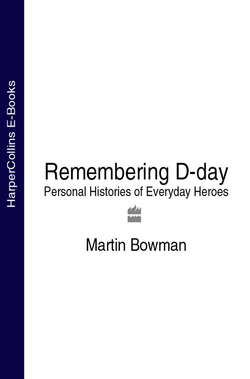Читать книгу Remembering D-day: Personal Histories of Everyday Heroes - Martin Bowman - Страница 78
George Rosie
Оглавление101st Airborne. Captured, he spent II months in PoW camps before being liberated by the Russians south of Berlin.
‘We boarded the planes at about 22:30 on 5 June. With two chutes and full combat equipment, we could hardly walk. Some of the men looked like they were scared to death. I was certainly uptight but had no thoughts of being killed. I had the feeling we were part of a big chunk of history. Out of the window, there were planes in every direction and, below, hundreds of ships. As we crossed the French coast, a plane on our right was hit by flak and blew up, wiping out 18 to 20 men. Welcome to the real war.
‘The green light came on and we jumped. I hit a road and went head first through a wooden fence, knocking out two teeth. Then I took cover in a hedgerow. A minute later 40 Germans came marching past. I could have reached out and touched them. Being alone behind enemy lines is a unique experience. You feel so helpless, so alone. After a bit I ran into John Gibson, our medic, and Charles Lee, a mortarman. It was as if I had found a long-lost brother.
‘I looked up and there was a C-47 transport plane at about 800 feet with the left engine on fire and troopers bailing out. The last one bailed out at not more than 200 feet and the plane went right over the top of our heads, hit the adjoining field and burst into a million flaming pieces. From the direction of the crash, four men came running towards us. We discovered they were from our troop – Phil Abbie, Francis Swanson, Leo Krebs and my high school pal Francis Ronzani. The downed plane had damn near got them.
‘We now had an army of seven but we ran into about 100 Germans as daylight was breaking. Abbie and Ronzani were killed and the rest of us were pinned down in a field. Bullets were flying all over the place and Leo Krebs remarked, “God, these guys are lousy shots.” A German officer was running back and forth and Krebs said, “What the hell is wrong with that guy? Is he nuts?” We shot at him and he went down. But we were in a hopeless position and were captured in no time.
Dead American soldier near his glider.
National Archives
‘Lee had got away into a wood and, a short time later, began shooting at the Germans who were guarding us. I told Leo I still had a hand grenade the Germans had missed. If Leo hit one of the guards I was going to throw the grenade at the other one. But the Germans circled behind Lee and killed him. I left the grenade in the ditch.
‘Ronzani had been hit in the chest three, four, five, or six times. I’m sure he never knew what hit him. When I returned to the States after the war and visited his mother and father, one of the things that seemed to be of great relief to them was that Francis had not suffered.’
Brigadier General “Slim” Jim Gavin, assistant division commander, 82nd Airborne, who at about noon on D+1 met Gen Matthew B. Ridgway at the point where the Ste-Mère- Eglise road crosses the railway line just east of the Merderet and as far as they knew, were on their own. Ridgway and Gavin decided right there and then that if the seaborne assault had been called off or been beaten back, then they would continue to fight to the end. Gavin, nicknamed “Slim Jim” by his men because of his slim, boyish looks, assumed command of the 82nd Airborne on 15 August 1944 at the age of 37, the youngest American division commander in WWII and the youngest since the Civil War.
U.S Army
